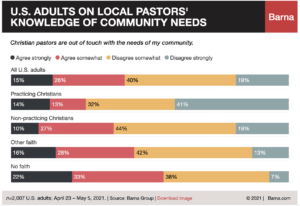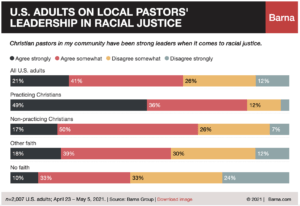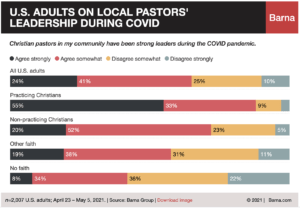A majority of Americans, churchgoing or otherwise, believe pastors are trustworthy and aware of the challenges faced by their local communities, new research by Barna shows.
Among U.S. adults, 59% either “disagreed strongly” or “somewhat disagreed” that local clergy are out of touch with neighborhood needs, the Christian research group said in “Are Local Pastors in Touch with Their Community’s Needs? Americans Weigh In.”
The Spring 2021 survey gathered data from practicing and non-practicing Christians as well as from non-Christians and Americans with no religious affiliation. Significant differences often were found between the population as a whole and its Christian segments.
 “Unsurprisingly, practicing Christians are the most likely to believe that local pastors are aware of their community’s needs, with 73% affirming this,” Barna reported. “Non-practicing Christians are not far behind, with over three in five (63%) saying the same.”
“Unsurprisingly, practicing Christians are the most likely to believe that local pastors are aware of their community’s needs, with 73% affirming this,” Barna reported. “Non-practicing Christians are not far behind, with over three in five (63%) saying the same.”
Those who consider pastors to be out of touch includes 27% of practicing Christians, 37% of non-practicing Christians, 44% of those with other faiths and 55% of people with no religious affiliation.
Barna defined “practicing Christians” as those who self-identify as Christians who attended worship within the previous 30 days and who strongly agree that faith “is very important to their life.”
For non-Christians, the data tell a different story. “Among those with other religious beliefs, about two in five (44%) say pastors in their community are out of touch with local needs. That percentage rises to over half (55%) among those of no faith.”
Barna also asked respondents if pastors are more concerned about growing their congregations than they are about community transformation.
“U.S. adults are largely split when responding to this statement — 54% agree at least somewhat, while the remainder disagree. Practicing Christians are most likely to counter this statement, with seven in 10 (70%) disagreeing at least somewhat. Meanwhile, similar to U.S. adults, non-practicing Christians are more split on this topic.”
 The survey also examined the trust level enjoyed by pastors and assessed their performance through the COVID-19 pandemic and months of racial unrest.
The survey also examined the trust level enjoyed by pastors and assessed their performance through the COVID-19 pandemic and months of racial unrest.
As a whole, pastors are trusted by most Americans, with about 47% of adults reporting they personally know a pastor and 62% saying they deeply trust pastors. Among practicing Christians, 89% agree at least somewhat that they deeply trust the pastors in their communities.
Faith in Christian clergy drops as Christian engagement drops, according to the report. Just more than 50% of respondents from other faiths agreed somewhat or strongly that they trust pastors. Only 5% of Americans with no faith agreed strongly that pastors are trustworthy, while 26% somewhat agreed they are, Barna said.
But the survey uncovered a strong admiration for pastors among non-practicing Christians who “still largely agree they deeply trust a pastor personally (74%).”
Pastors also fared relatively well on the issue of the racial conflict that erupted last year. “Overall, when asked if local pastors have been strong leaders when it comes to racial justice, three in five U.S. adults (62%) agree.”
Analyzing that according to faith practice, however, tells a different tale, Barna reported.
“While nearly half of practicing Christians (49%) strongly agree that pastors in their community are strong leaders in regard to racial justice, that number drops over 30 points among non-practicing Christians (just 17% strongly agree) and those of other faiths (18%). Among those with no faith, only one in 10 (10%) agree strongly that local pastors have led well in this area.”
 Pastors scored higher marks for their leadership during the pandemic, with 65% of American adults agreeing at least somewhat that local clergy did well during the public health crisis. Of the 35% who disagreed, only 10% did so strongly.
Pastors scored higher marks for their leadership during the pandemic, with 65% of American adults agreeing at least somewhat that local clergy did well during the public health crisis. Of the 35% who disagreed, only 10% did so strongly.
Barna pointed to its 2017 “State of Pastors” survey to give context to the position of clergy in American society.
“The data showed two out of three U.S. adults (66%) and nine in 10 practicing Christians (91%) viewed pastors’ presence as a benefit in their community, while nearly the same percentage (64% U.S. adults, 87% practicing Christians) had a very positive opinion of a pastor they personally knew,” Barna said.
Related articles:
‘Yes, and’: A response to stories of pastoral angst in the present moment | Opinion by Mark Tidsworth
No surprise among ministers that public doesn’t trust clergy
Churches adapted rapidly to the pandemic, but there’s a mental health cost to that success


